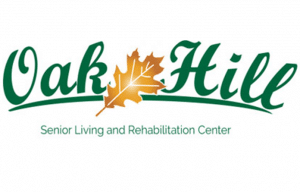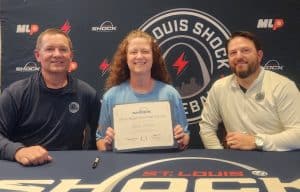Clothing partnership helps refugees

By partnering with The Collective Thread to manufacture their best-selling jumpsuit, Philomena + Ruth at 118 W. Mill Street in Waterloo is supporting women refugees and immigrants in St. Louis.
“Our mission is to empower women through independence and a living-wage job,” Terri Stipanovich, CEO and founder of The Collective Thread, summarized.
The nonprofit does this through two main components: education and services.
“We offer a free sewing school primarily targeted toward refugee and immigrant women in need of a living-wage job,” Stipanovich said, adding other community members may participate in the classes too. “We do design classes, beginner, intermediate and advanced sewing classes.”
The Collective Thread then gives these women the opportunity to put their new skills to use and earn a steady, livable income at the same time.
“The way that we provide employment is we have a small-batch manufacturing facility, a large factory of 7,000 square feet where we do apparel manufacturing, and then we also do product development, which is people who have new products that they need patterns made, graded, tech packs and sampling.”
Philomena + Ruth uses The Collective Thread’s small batch manufacturing service to construct its best-selling “everyday jumpsuit.” Currently, approximately half of the factory’s employees are immigrants and refugees.
“We do take 100 as our minimum, but in the industry you’ll see that 500 to 1,000 is considered small-batch manufacturing, so (it is) anything less than that,” Stipanovich said about the concept, adding there are very few places in the states that do this type of manufacturing.
Philomena + Ruth owner Elizabeth Hahn explained how The Collective Thread plays an integral role in producing her store’s coveted jumpsuits.
“They’ll do a variety of things starting from your basic design and up, but because I already had an established design and I have my fabric sourced already, basically what they did for me is they digitized my patterns so they could easily cut them and get them stitched together for me,” Hahn said. “So I’m providing them with the fabric and patterns, they’re cutting and sewing and then they send them back to me and I complete them with the hand-dyeing process.”
Hahn said being introduced this summer to The Collective Thread by Bohemian Babies founder Amanda Whittle, who also partners with the nonprofit, was a game changer.
“Prior to that, all of my handcrafted clothing was made by me and my mother-in-law. We just got to the point where we really couldn’t keep up (with the demand) – I was selling so many wholesale to other stores, I was selling them online and I could never keep up to have enough of them in my own store,” Hahn said.
Both The Collective Thread and Philomena + Ruth have interconnecting missions, Hahn said.
“I’ve always been a handcrafted, handmade line – that was always important to me – so (in taking) that step to move out of my hands being the one making it, I wanted to make sure it was a company that had the same ethos and values as us, which basically comes down to making the world a better place and never just doing things for the almighty dollar or just for our own advancement,” Hahn said.
“Everything that I do is to make everybody’s lives better, not just mine, so I love that that’s what their mission is too. They’re not just out trying to make a buck, they’re out there really trying to make the world better and sort of level the playing ground for so many of us,” she continued
Because of this, Hahn made it a point to travel to the old garment district to pick up her products in-person before The Collective Thread switched to outdoor pickup and dropoff only.
“I like being able to go there and see them in-person; I see the facility and get to know the seamstresses, the quality-control manager and things like that, so it’s nice to have that in-person pickup,” Hahn said, stressing, “The money that they’re making from small designers like me is directly going to help make the lives better of these refugees who are coming to St. Louis for a better life.”
The nonprofit has a long history prior to its partnership with Philomena + Ruth, beginning with Stipanovich visiting Ethiopia on a mission trip over a decade ago. While there, she witnessed how many women were economically forced into sex trafficking because they lacked skills necessary to work.
While that mission trip focused on a broad variety of relief efforts, Stipanovich knew she wanted to hone in on women specifically. So, in 2009, she founded a nonprofit organization called Faith That Works that focused on empowering women in Ethiopia and immigrants in St. Louis.
Under this nonprofit, Stipanovich founded a sewing school in Ethiopia.
“I just really had a hankering to do something in a business sense to give women a real skill that could be something – whether it became a supplemental income for their families or full-time – so that they could do something to earn a wage, and so we developed a sewing school and we started in Ethiopia,” Stipanovich explained.
The refugees and immigrants Stipanovich was working with in the U.S. showed interest in this school, promoting Faith That Works to start one in St. Louis with the help of Elizabeth Davleer, a recent fashion design school graduate.
The nonprofit then began retailing what was made in-house, acting as a manufacturer, seller and marketer all in one. Just as Stipanovich was feeling burnt out and considering shutting down some of the St. Louis programs, she was approached by some local apparel brands.
“Unbeknownst to me, there was a real need in the soft goods and apparel business in St. Louis and around the country for what we had, which was sewers. Many companies just couldn’t find manufacturing. It’s very difficult to find small-batch manufacturing in the states, and so that’s when we pivoted and started developing this model of offering those services to companies,” she said.
With that, Faith That Works rebranded to The Collective Thread with the help of Annie Miller in 2019 and really began honing its niche of small-batch manufacturing for other companies.
The pandemic limiting travel and violence in Ethiopia led to Stipanovich turning over the sewing school in Ethiopia to another organization, however, she does still have ties to it.
“What’s happened over the past 11 years of this organization is we started out with a mission and an idea and it took a lot of different faces, but we’ve always stuck to the mission of empowering women,” Stipanovich summarized. “What we’re doing now is really exciting because we’re still a nonprofit. We still have a vital outreach to people in need of a skill and a job, but then we also have this growing business that is able to fund a large portion of what we do in the nonprofit portion of it.”
Now, the nonprofit boasts nine partners, many of which need larger quantities of their product(s) produced than Philomena + Ruth and Bohemian Babies.
Changes in the nonprofit’s operations were not the only pieces that changed since its conception. Prior to immigration policies changing under the previous presidential administration, The Collective Thread was welcoming refugees and immigrants from a wider variety of places – including Syria, Somalia, Afghanistan and Nepal – Stipanovich said.
Now, the immigrant and refugee landscape in St. Louis appears much different.
“When we first started, our classes were completely full with refugees,” Stipanovich said. “(With) the (Trump) Administration … we just didn’t have the same influx of refugees in St. Louis for 4-5 years. Then with the pandemic, after the administration, there’s kind of been a lull in immigrants coming to the United States. Now we’re seeing St. Louis promise 500 Afghan families will be arriving, and (they) have started to arrive, and that’s wonderful for our city.”
The Collective Thread is working with the International Institute to ensure these new families know about the opportunities at The Collective Thread.
As Stipanovich detailed in a letter to the nonprofit’s supporters, two of The Collective Thread’s Afghani staff members have family back home who are being targeted by the Taliban. In response, the nonprofit is working to help obtain U.S. Humanitarian Parole Visas for their families, as well as find sponsors.
For more information, see the letter, which is linked on The Collective Thread’s Facebook Page.
The pandemic has brought challenges for Philomena + Ruth and The Collective Thread, but the two have held strong in their commitment to keeping employees and customers safe.
Much of The Collective Thread’s work at the beginning of the pandemic was making masks. Stipanovich and her staff found a way for their employees to fill this need from home.
“(Making masks) was an easy enough thing that the ladies could make those from home. We made kits at the Collective Thread, they would come and pick them up, take them home, make them, we would have a safe pick up and drop off,” she explained.
Once COVID-19 vaccines saw full approval, The Collective Thread helped dispel misinformation amongst its staffers, Stipanovich explained.
“When the vaccine became available, everybody got vaccinated … A lot of our refugees were really, really afraid of getting the vaccine. They just didn’t want to get it, and so we had to help explain to them why it was important to get the vaccine. I think a lot of times there is misinformation out there,” Stipanovich said.
Hahn also enforced a vaccination mandate for Philomena + Ruth staff.
“All of our employees are vaccinated – the two employees that I have left including myself. Unfortunately, I did lose half my staff because of vaccine issues. It’s not a decision I’m taking lightly,” Hahn shared.
Two years into the pandemic, Hahn said her store is still impacted by the pandemic and others’ responses to it, as she is one of few retailers in Monroe County asking customers to mask up while inside.
“I am still limited in my in-store (operations) because the community isn’t practicing safe COVID practices, so it’s been difficult for me to open back up that line of sales,” Hahn said. “Now that so many other stores are back open and people aren’t necessarily wearing masks or they’re not making people wear masks inside (and) because I am a business who is still being cautious with that, I’m losing business both online and in-store because those people are going to the businesses who aren’t necessarily making them wear masks.”
Because of such challenges, Hahn said it is more safe and economical to have the brick-and-mortar open for limited hours and focus more on online and wholesale orders. Most recently, Philomena + Ruth has been hosting a series of holiday open houses and Hahn decided to have the Waterloo storefront closed into the spring, possibly longer.
While these decisions have been difficult, Hahn said they are necessary to support the store’s overarching goal: to be a safe space for everyone.
“It’s really important for me to make sure that I am doing everything I can to keep everyone safe,” Hahn said. “Even if it’s just one customer who comes in and is able to come in because they know I’m doing things safely – that we are vaccinated and we are requiring masks – that’s all the reason I need. That’s really important to me because it’s my safe space and I want it to be everyone else’s safe space.”
Philomena + Ruth will continue its buy-online, contactless pickup option. With the holidays promising higher chances of COVID-19 spread and news of the Omicron variant, The Collective Thread is taking a similar precautionary measure by only offering outside pickup and dropoff options.
For more information on The Collective Thread, visit thecollectivethread.org. Visit philomenaandruth.com for more on that store’s happenings – including details on its holiday open house taking place Saturday, Dec. 18, from 10 a.m. to 6 p.m.






